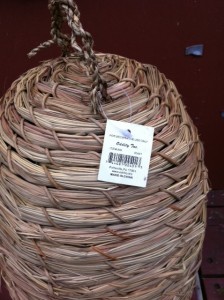Here’s a photo of part of a woven basket that looks like a beehive. I took this photo earlier today in Colonial Williamsburg. It was on sale at an open-air market on Duke of Gloucester Street. I’m not certain what such a thing was used for in 18th-century colonial Virginia, but it matters not. I love how this woven basket in 2013 testifies to the reach and wonders of globalization!

Most obviously, this item is labeled “Made in China.” Only a bit less obviously, it is imported to America by a company located, not in Virginia, but in Pennsylvania. And it is being sold in Colonial Williamsburg as a reproduction of an item that was used 250 years ago in British Virginia.
I’m quite sure that more than one American, strolling in Colonial Williamsburg, saw one of these baskets and, shaking his or her head, lamented that such things are no longer made in America. Such laments, however, reveal the all-too-common failure to think seriously about economics. While baskets such as these as were actually used in Williamsburg in the 1760s were almost certainly woven in southeastern Virginia by Virginians, would Americans today really be wealthier if we wove our own baskets rather than bought such things from Chinese producers? Would it really be progress to restore in America crafts and trades that were common here when George III sat on the British throne?
Of course not.
It pays Americans – hyper-productive and astonishingly rich by historical and even current world standards, and with access to myriad opportunities – to specialize in productive activities with far more value-added than basket-weaving. That some Chinese people today find basket-weaving to be a profitable use of their time, efforts, and capital testifies only to the still relatively primitive condition of much of China’s economy. We Americans should pity the Chinese workers whose circumstances are so poor that weaving baskets is their best option. We should not envy them or suspect them or their government of ‘stealing’ from us some blessed economic opportunities.
On the other hand, we should applaud the Chinese people, who make these baskets, for their work and enterprise. We should recognize also that, should the Chinese continue to rely upon and respond to market forces, they too will one day be as fortunate as we Americans are in 2013; they, like us, will not have to weave baskets to make a living.



